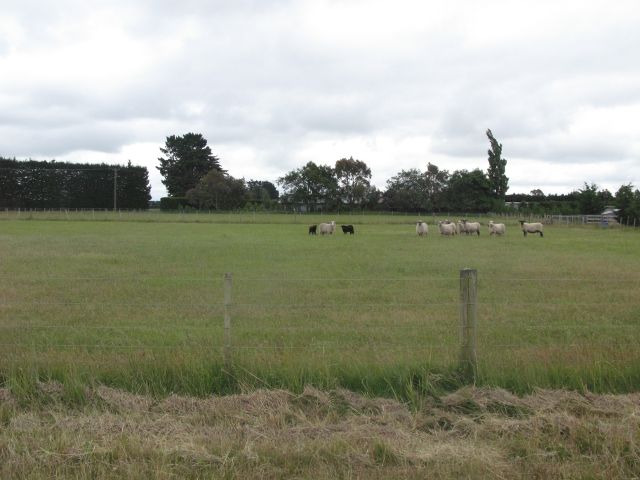We don't seem to have had the easiest of babies. My son, Bob, was once described by a plunket nurse as "the worst baby in Christchurch"; his little sister, Polly, is -- in my estimation -- only very marginally better.
Not that it's her fault. It transpires that, like her brother, she's allergic to dairy products. But not only dairy products -- she's also allergic to soy products. Oh, and eggs. And did I mention her really inconvenient allergy to wheat?
All in all, it's taken us a while, and a whole bunch of tests and experimentation to figure everything out. And to discover all those tricksy allergens hiding in places where you'd never have thought to look (anyone ever suspected that baked beans would contain wheat?). We've gradually managed to improve Polly to the point where she's well enough to wake only three or four times per night -- but that's still fairly hard going in anybody's book.
Of course, at the same time we've also had three major earthquakes. And the entirety of our earthquake-damaged neighbourhood has been condemned. And, as you know, our insurance company has found a (perfectly legal) loophole to avoid paying out on our total replacement insurance policy.
So since the declaration of the Residential Red Zone -- in between the baby drama and paying employment -- I've been working non-stop in an attempt to stave off financial disaster for our family. My solicitor is now the most frequently dialled number on my phone; our entire household is totally sleep-deprived. It's been a hard year.
To make a long story short: it turned out that the only way we could preserve the equity in our house was to pick it up and relocate it to another section -- and have it repaired there. Luckily we've been assigned a very professional and competent claims manager at our insurance company, who (while still saying "no" much more than I'd like) has been extremely helpful in moving us towards a possible solution.
There are, however, several problems in buying replacement land for our house. Firstly, we can't afford a section in Christchurch at post-quake property-boom prices. Secondly, CERA has decreed that we must relocate our house elsewhere by May next year -- a very short time frame indeed for this type of job.
Thirdly, the CERA process means that we can't access any of the help in terms of accommodation or a deposit for new property that's available to other people -- yes, it's ironic that the homeowners who have taken the biggest financial hit (i.e. those in the Residential Red Zone who have lost their 'total replacement' insurance and must therefore relocate their houses) have also been excluded from many of CERA's assistance packages. In particular, our ineligibility for the deposit scheme means that we have to borrow a truly horrendous amount of bridging finance.
Fourthly, there's the issue of 'covenants'.
I'd never even heard of covenants before I started looking for a replacement section, but here's how they work in New Zealand: when a landowner wants to subdivide rural land into residential sections they must obtain permission from their neighbours -- and this usually involves the imposition of various 'covenants' that constrain the actions of any future owners of that land. These range from the permitted height of the hedges, to the permitted position of buildings, to the type of dog they're allowed to own (I'm not kidding). The one covenant that invariably applies to any section within an hour's drive of Christchurch is a prohibition against the relocation of old houses (no matter how nice), because neighbours fear that it might reduce the value of their own property.
So the choice of new land for our Edwardian villa becomes extremely limited: only sections that are a very long way from Christchurch; usually beside a state highway or railway line; often with power pylons or something else weird on the property.
We spent months looking, and finally found a better-than-most section about 50 kilometres from Christchurch. Yes, it was next to the railway line; and, yes, it was right beside a state highway -- but it was also located in an old Canterbury village with nice Edwardian and Victorian houses (who didn't object to ours), and stunning views of the Southern Alps. So we paid a deposit, and started planning a new life in the country.
And then we discovered the boundary problem.
We'd been told by the real estate agent (with no deception intended on his part) that the fences were on the boundary lines for the property. But when we surveyed the section we discovered that one of the fences was some 26 metres from where it should be -- and, in fact, a huge chunk of the land we thought we were buying actually belonged to the neighbours. This was a complete surprise to everybody: the real estate agent, the vendors, and the neighbours themselves. But we had the biggest surprise of anyone because the post-survey shape of the section revealed that we couldn't fit our house onto it -- or, at least, not without spending tens of thousands of dollars that we didn't have.
So we had to disentangle ourselves from the purchase. And this, of course, involved more lawyers, more legal fees (we'd already paid about $6,000 in consent and legal fees by this stage), and a lengthy delay before we could place an offer on any other section.
If you want a defining snapshot of my life during this year, then here it is: I wake exhausted after working until 3.00 am trying to make headway on our financial problems, followed by a semi-sleepless night of Polly's problems (my wife has, of course, had an even more sleep-deprived night) -- but happily, for the first few seconds of my morning awakening, I experience a pleasing memory blankness. And then the awareness of our situation and seemingly insurmountable problems comes flooding back, and my heart begins to race: "ker-thump, ker-thump, ker-thump". And that's the way it stays for the rest of the day.
A fortnight ago -- given the almost impossible deadline imposed by CERA for relocating the house, as well as the virtual non-existence of suitable land -- we decided to cut our losses and walk away from everything. It simply wasn't worth the stress. And since we were already psychologically adjusted to moving to the country, we thought that we'd attempt to buy a cheap house in one of the rural townships of Canterbury (my wife's job keeps us in the vicinity of Christchurch).
One of the possibilities was a residence in Dunsandel. We rejected the house, but as we drove away -- only a few hundred metres down the road -- we discovered a section that hadn't yet been advertised. It didn't have covenants, and seemed in almost every way perfect for our old Edwardian villa (the 'almost' being a slight weirdness in terms of the disposal of wastewater).
And so we bought it.
Such are life's unpredictable reversals of fortune. There's still a lot that can go wrong, of course, but we've made all the consent applications and nothing disastrous has yet happened. If we can pull it off, we'll lose less than twenty thousand dollars between what we originally paid for our house and its estimated value on the new section. And that seems like a pretty good deal in comparison with the other options.
Not to mention that the section has wonderfully liquefaction-proof gravelly soil, and is well above the tsunami risk zone, and isn't located in a flood-prone area, and is only a brief drive (downhill) to Lake Ellesmere. In short, a wonderful location for a young family.

Above: the new location for our house.
My intention is to document the next stage of proceedings fairly thoroughly. There'll be a lot to tell about the partial dismantling of the house (with the occasional help of the saintly Ian Dalziel), the relocation (left to the experts), and the eventual repair of the house in its new location. I hope you won't mind some technical details.
For now, I have another busy week ahead of me, albeit with enormously less stress than in the previous six months. I find that -- to my surprise -- I'm quite looking forward to Christmas.

